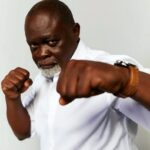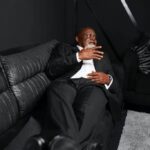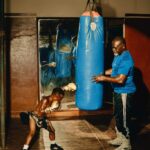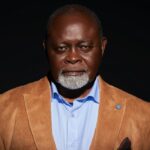“Boxing wasn’t just something I did for a living. I loved it!”
Azumah Nelson, a man of few words and seldom without a smile to share, looks like he spent his entire working life in the wrong business.
Behind that affable veneer, though, is a man who could pack a hefty punch – literally – and talk up a storm in his heyday.
“It was just the job,” the sexagenarian says of a lengthy boxing career that propelled him into the pantheon of the sport’s greats.
“A man’s got to do what a man’s got to do.” A man…
The Asante/Akim Twi translation of that phrase – Barima – was one of the many flattering and fitting nicknames Nelson bore throughout his career, and still responds to these days.
It’s a reputation he earned and honed through many nights and many fights – some straightforward, some grueling – against the biggest names in the weight divisions he contested. That’s a life he almost didn’t have, however.
Growing up as the firstborn child in a family of six – and of limited means – Nelson’s position among his siblings (the eldest of six) made him, by default, a ‘third parent’.
“I had to, at age 13 or 14, get out there and contribute my quota to the family’s upkeep, doing whatever I could.”
And, given his heritage, there was no shortage of trades for him to learn, one of which – tailoring – his father practised.
Nelson is a descendant of an Afro-Brazilian band of former slaves who returned to the coasts of West Africa in the 19th Century following the Malê rebellion of 1835. Those that settled in the Gold Coast (now Ghana), arriving in Jamestown, Accra, were led by Nii Azumah Nelson (sounds familiar?), and came to be known as the Tabom people.
Through inter-marriage, they were gradually absorbed into the native Ga tribe, but it was their industry that really endeared them to the locals. They introduced new skills in agriculture, architecture, smithing, and carpentry that improved the quality of life of the community in which they settled.
Their claim to fame, though, was in cloth-making, where they opened the first tailoring shop in the country, tasked, notably, with providing the then national army with uniforms.
Nelson did pick up his father’s work for a while, also selling coconuts on the streets of the capital, but he had his sights set on loftier targets by age 15: to be a boxing world champion.
His start, as an amateur, was unsurprisingly inauspicious, but it wasn’t very long before he started gaining recognition – and prizes.
Nelson won, in 1978, gold at the All-Africa Games and the Commonwealth Games — a month apart — and looked to build on those successes, putting in the work required to become Ghana’s first Olympic gold medallist. But that chance, at the 1980 edition of the quadrennial global festival, was denied Nelson.
“Few months to the Games in the Soviet Union,” he explains, “Ghana [along with over 60 allied nations, including the United States of America] boycotted it to express opposition to the ongoing Soviet- Afghan War.”
Disappointing as that turn of events was, Nelson couldn’t just sit around and moan and wait another four years. He decided to step it up a notch, punching his way into professional realms — but only after nearly taking a decision that could have seen him do battle on a different sort of field, and win medals of a different sort.
“I almost took a detour that would have led to a career in the military,” Nelson says.
It’s hard to fault a young Nelson for harbouring such ambitions. Being a soldier in that period was certainly exciting, if not necessarily attractive. Soldiers, at the time, called the shots politically and enjoyed greater prominence than, perhaps, at any other point in Ghanaian history.
Incidentally, it was arguably the most famous Ghanaian soldier of them all — the late Flight Lieutenant Jerry John Rawlings — who persuaded Nelson to stick to fighting with his arms, not the arms.
“It certainly proved the more rewarding, more fulfilling choice,” Nelson gladly concedes. “If I had joined the military, I realise, with the benefit of hindsight, the highest honour I could ever have retired with was probably the title of a ‘general’.”
Instead, Nelson, by the time he quit boxing for good – in 2008, a decade after he first hung his gloves – had achieved far more than he might have in army fatigues, with more to show for his troubles, too.
In June 2004, he was inducted into the International Boxing Hall of Fame, and his image now decorates the WBC super featherweight belt (one of two titles he won). Nelson’s pension, too, seems much more comfortable than what the average ‘old soldier’ might be entitled to.
Needless to say — and he’d be the first to admit that — Nelson owes much of those accomplishments to Rawlings, the former Ghanaian head of state who passed away late last year.
To most of his countrymen, Rawlings was just a leader — of whom memories are either fond or sour, depending on one’s experiences of his regime – but, to Nelson, he was much more: a friend, mentor, and benefactor.
“There were times when even the most basic food items were scarce in Ghana, yet Rawlings ensured that I always had enough to eat,” Nelson says, “and of this I would only learn years later.”
Those, indeed, were incredibly tough times. The eighties, especially, brought some very challenging years, hardened by drought, economic sanctions, and a mass deportation from neighbouring Nigeria.
There weren’t many sources of relief and belief for Ghanaians as they stumbled through that seemingly never-ending dark tunnel, and Nelson provided some of the rare moments worth cheering.
Entire villages would keep wake, gathering around black-and-white TV sets powered, in some cases, by car batteries, in the middle of the night to watch this son of the land make Ghana proud overseas. Not many, at the time, must have known that Nelson himself secured the rights for some of those fights to be broadcast on Ghanaian television; not that he was bothered, anyway.
“Knowing that the entire nation was behind me, watching and praying, was why I did everything to win my fights and put all I had on line,” he says.
“I will love Ghanaians until I die.”
Nelson’s voice, in every syllable, reveals how much he thrived, and still thrives, on the love and affection of his people. It was as though, even when up against some fierce opponent several miles away from home, he could feel those emotions; as though it all made blows easier to take and, more crucially, easier to land. Throughout his career, Nelson never cut the umbilical cord through which that support was supplied. It is the norm, among boxers, to move from their homeland to the sport’s ‘Mecca’ — America – or somewhere closer to the action, and where life would certainly be easier.
That easy life, though, wasn’t for this patriot.
“I would go fight, win — or, rather rarely, lose – and return home,” he says, with a glint in his eye. “I believed in staying in my own corner, Ghana, and controlling the world from there.”
Fame and affluence, as those who have enjoyed either or both would tell you, wield an axe capable of swiftly cutting one off from his roots. But Nelson wasn’t the type to be carried away by his newfound status. It wasn’t just his country that he refused to leave behind; he remained strongly attached to those in his immediate circle, the people he grew up with, even at some personal cost.
He married one of those, Beatrice, who lived only a couple of houses away from his. Together, they had three children; before Nelson’s teenage sweetheart lost a battle to cancer (he now has three more kids, with current wife Peggy).
He also tried, in vain and in pain, to lift some of his earliest friends out of poverty. “I bought a number of long vehicles with which they could transport fuel for sale, but their nefarious activities forced the end of that endeavour,” Nelson, with disappointment etched on his face, narrates.
Later, I started another business – production of an alcoholic beverage, Zoom Zoom Gin – to help them put food on the table, but bad nuts among them made a habit of stealing raw materials and even some of the revenue generated.”
Ultimately, though, that enterprise was collapsed by something else: Nelson’s realisation that the abuse of the beverage, powered by his brand, was driving many a youth wayward.
He cared too much — far too much — to profit at the expense of their well-being.
Another thing Nelson has always cared about is his faith in God, of which he speaks whenever the occasion presents itself.
“In a sport where many rely on the supernatural for success — and I did encounter a fair few of such experiences in my time — I genuinely believed only God could see me through,” he shares.
- Wasiru Mohamed is the new hope for Ghana boxing- Mr. Boham
- Richard Commey will be an interesting challenge – Lomachenko
“Quite often,” Nelson claims, “I’d have visions of how fights would play out, even down to the very round and the exact manner in which my opponent would succumb — and it would, without fail, come true!
“It’s why they called me ‘prophet’ nearly as often as they called me ‘professor’,” he recalls with pride.
And it is with pride, really, that Nelson looks back on all he has achieved, none of which was offered on a silver platter.
“It was all about sacrifice — training, eating properly, and even refraining from pleasures like alcohol and women, and then some,” he says.
It never felt like too much, such was Nelson’s passion for what he did.
“Boxing wasn’t just something I did for a living,” he says. “I loved it.”
And it’s a lesson he wishes everyone, boxer or not, would learn.
“Anything that you do, whether as your own boss or for another, just do it well. Just do it well, and you’ll see the glory of God.”
But, of course, money mattered, and Nelson always demanded his due, like on that occasion when he had to stand up to the great boxing promoter Don King. Notorious for, among other things, underpaying some of his clients (for which he was sued more than once), King tried that trick on Nelson, and the latter fought back.
“For one fight,” Nelson recollects, “He offered to pay me an amount that was less than what I believed I deserved. When he insisted on having his way, and promptly departed, I got upset and decided to leave camp.”
“Somebody quickly called King and informed him of my threat. Before long, King returned and persuaded me to stay, acquiescing to my request.”
Further proof that Nelson was no softie and would eliminate potential obstacles in his quest to succeed?
Well, he once sacked one of the coaches in his own corner at the famous Madison Square Gardens, mid-fight, because he persisted with questioning Nelson’s methods and belief that he’d knock an opponent out in the second round… which, he assuredly did.
Renowned as one of Ghana’s greatest ever sportsmen, and arguably the finest boxer to emerge from Africa, Nelson has created a legacy for himself, into which many have tapped to build their own success stories.
Before Nelson, Ghana only had one boxing world champion; in the 37 years since he bruised and battered Puerto Rican Wilfredo Gomez to join the legendary David ‘Poison’ Kotei in that elite club, there have been six more.
Nelson, clearly, changed the game as Ghanaians knew it. His was a career that was spent defying stereotypes and odds, rising from nothing to everything, making a difference and inspiring hope.
Even now – with the strands of grey in his hair steadily catching up with those in his beard – he continues to inspire, primarily, with his foundation, going about his work with those traits that have always endeared him to Ghanaians and the world.
And, yes, even now, it’s still hard to believe that this man, soft- spoken, gentle, humble, and graceful, once punched others for fun.





